Module 1 Getting to know each other Unit 3 Healthy or unhealthy? 词汇与语法讲义(含答案)
文档属性
| 名称 | Module 1 Getting to know each other Unit 3 Healthy or unhealthy? 词汇与语法讲义(含答案) | 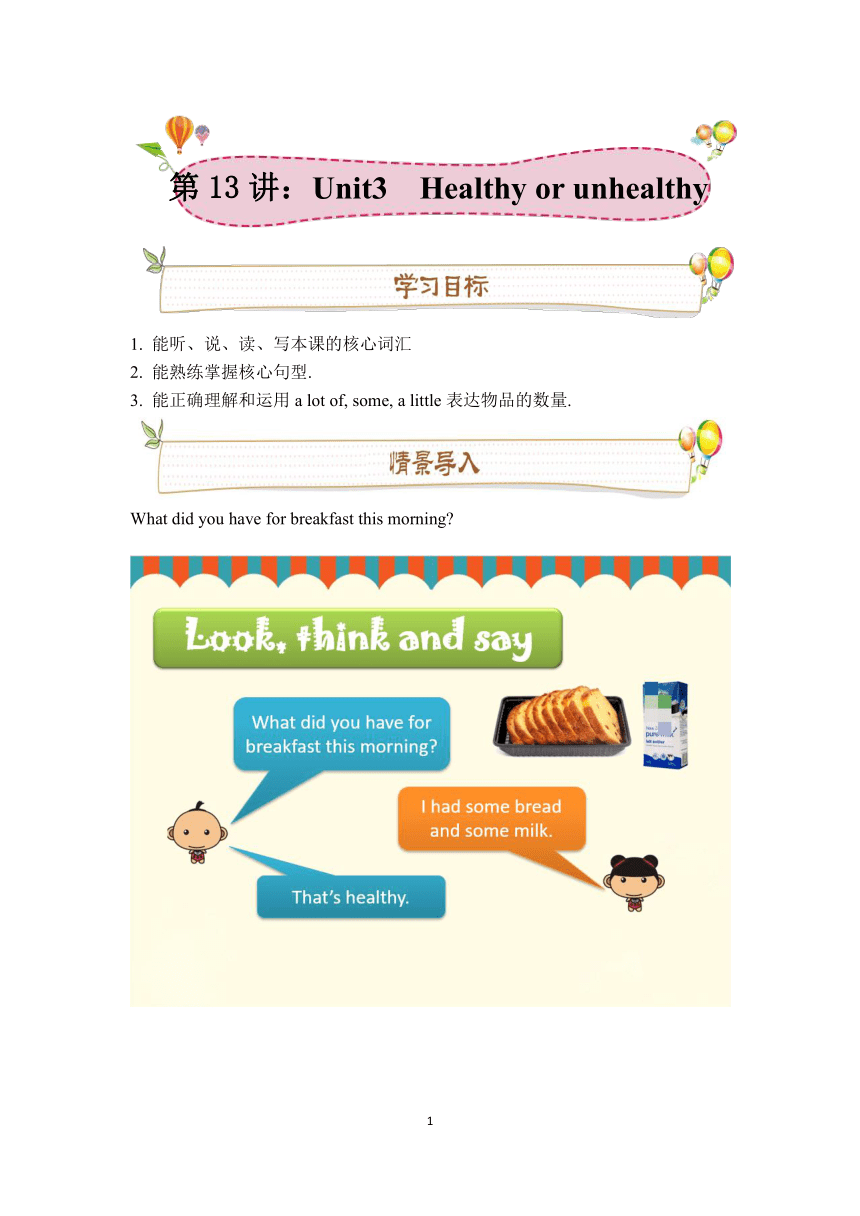 | |
| 格式 | docx | ||
| 文件大小 | 1.0MB | ||
| 资源类型 | 教案 | ||
| 版本资源 | 牛津深圳版 | ||
| 科目 | 英语 | ||
| 更新时间 | 2021-05-25 22:04:32 | ||
图片预览

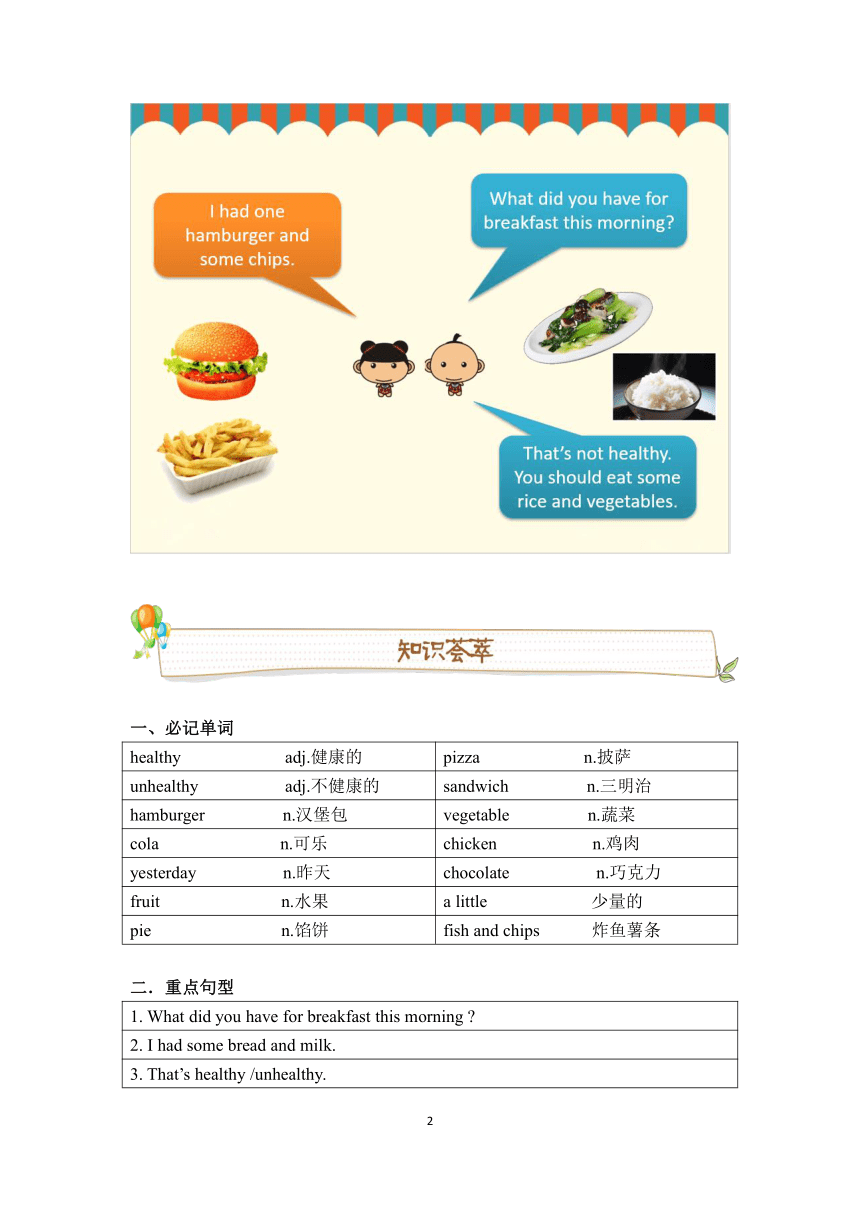
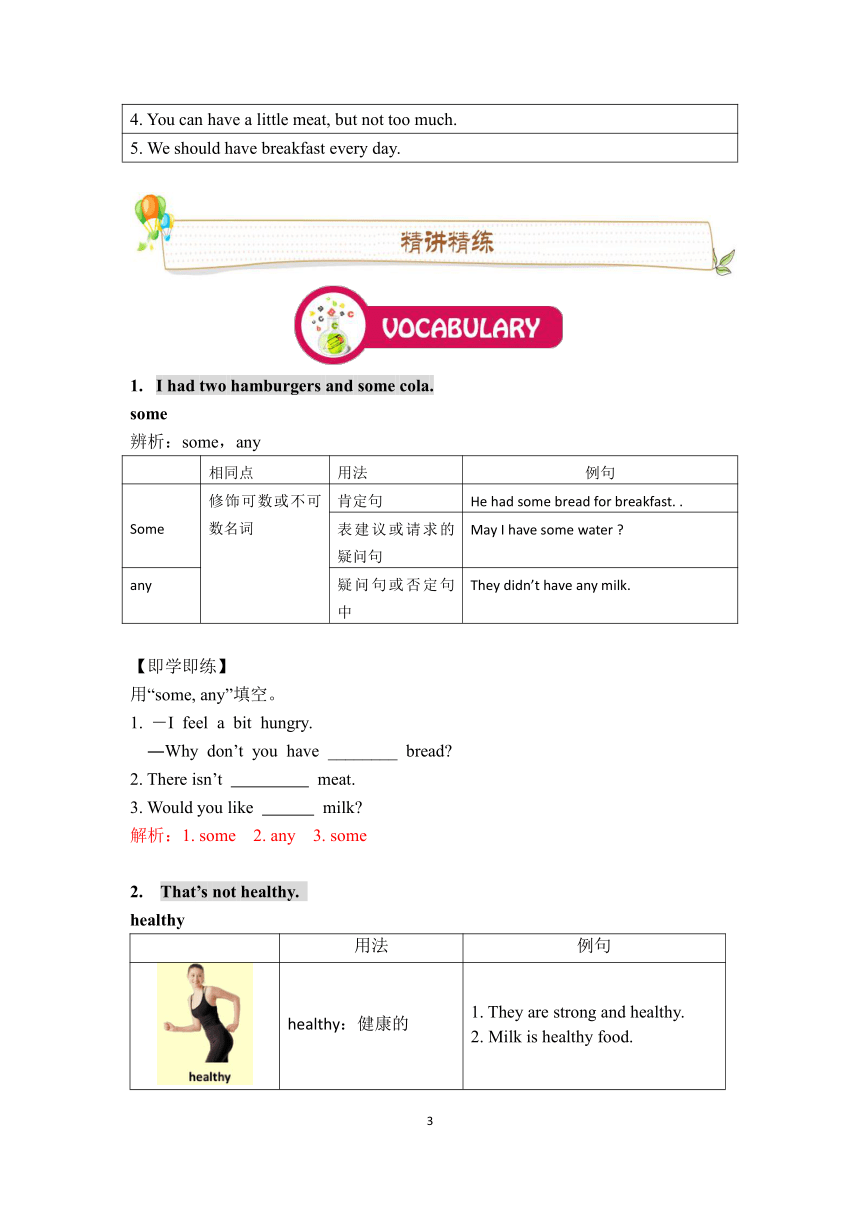
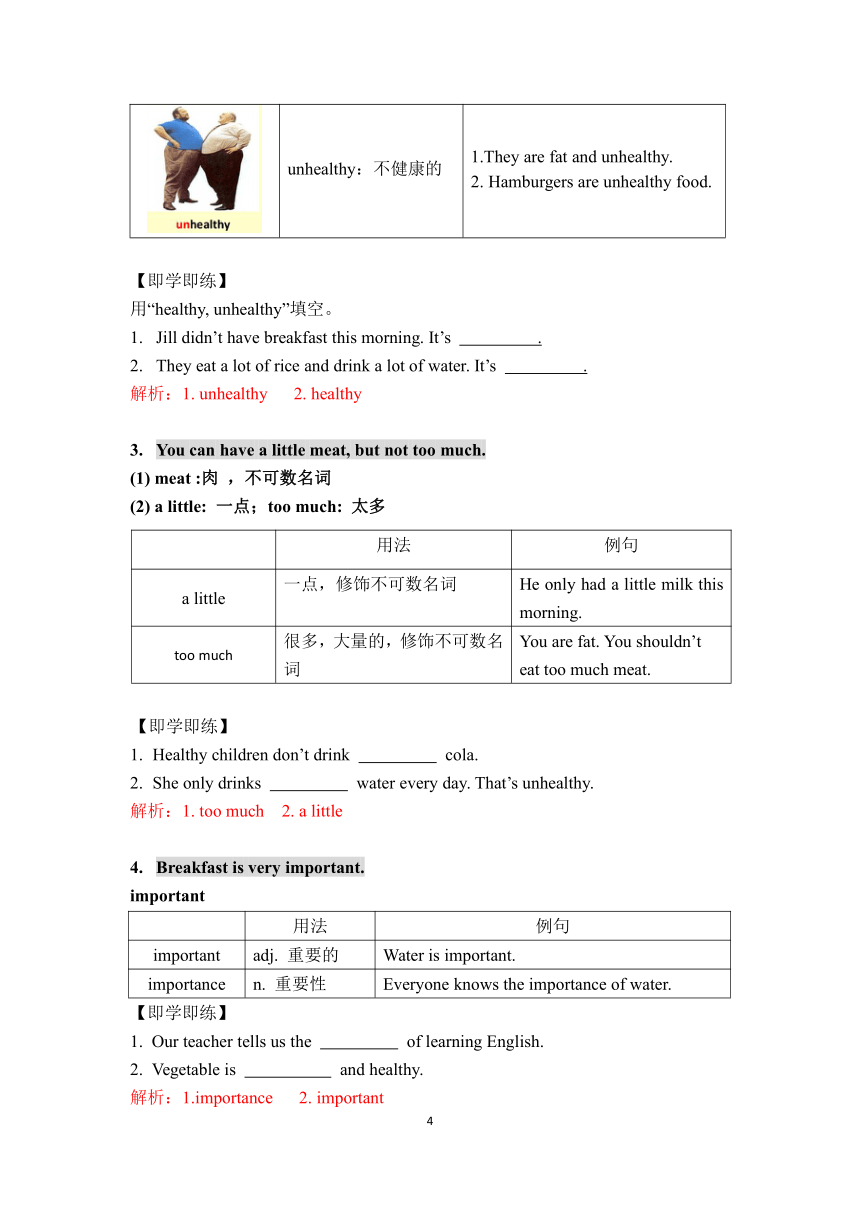
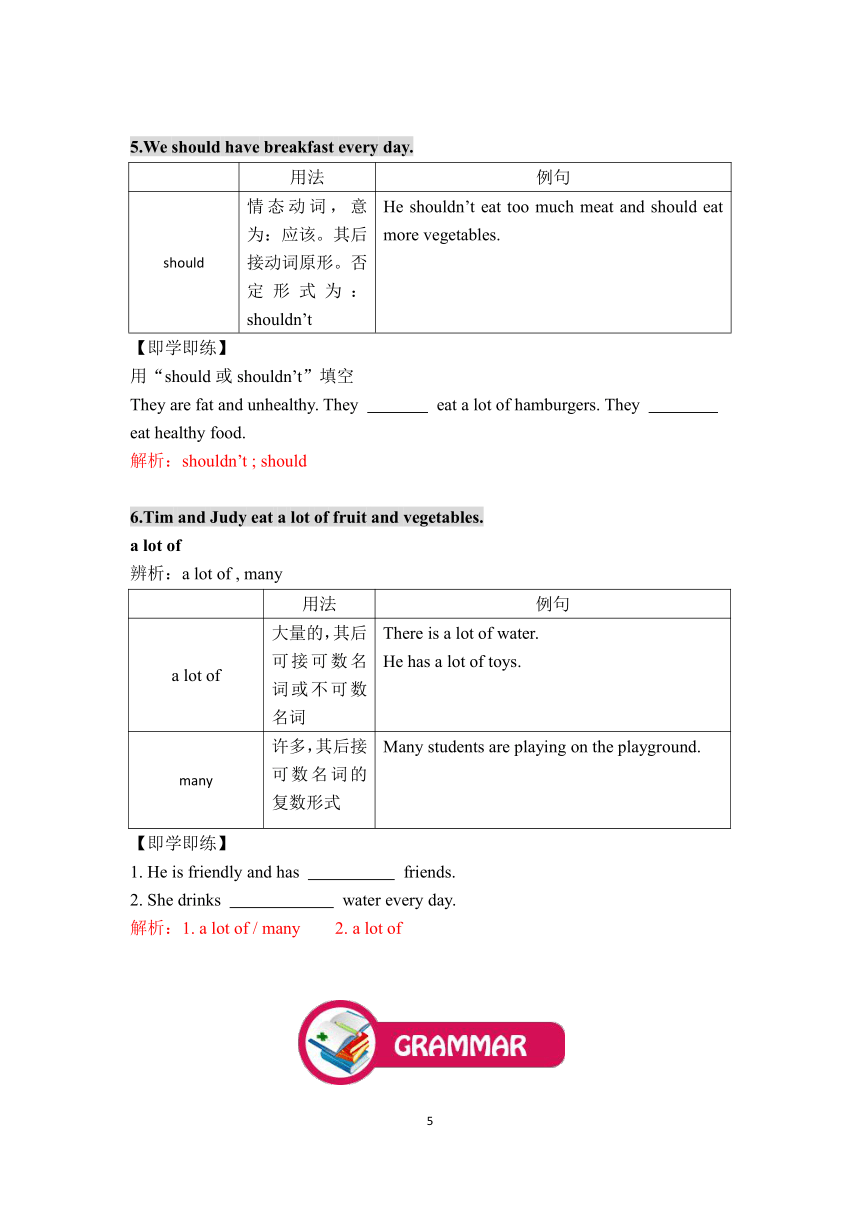
文档简介
能听、说、读、写本课的核心词汇
能熟练掌握核心句型.
能正确理解和运用a lot of, some, a little表达物品的数量.
What did you have for breakfast this morning
一、必记单词
healthy adj.健康的 pizza n.披萨
unhealthy adj.不健康的 sandwich n.三明治
hamburger n.汉堡包 vegetable n.蔬菜
cola n.可乐 chicken n.鸡肉
yesterday n.昨天 chocolate n.巧克力
fruit n.水果 a little 少量的
pie n.馅饼 fish and chips 炸鱼薯条
二.重点句型
1. What did you have for breakfast this morning
2. I had some bread and milk.
3. That’s healthy /unhealthy.
4. You can have a little meat, but not too much.
5. We should have breakfast every day.
I had two hamburgers and some cola.
some
辨析:some,any
相同点 用法 例句
Some 修饰可数或不可数名词 肯定句 He had some bread for breakfast. .
表建议或请求的疑问句 May I have some water
any 疑问句或否定句中 They didn’t have any milk.
【即学即练】
用“some, any”填空。
1. ―I feel a bit hungry.
―Why don’t you have ________ bread
2. There isn’t meat.
3. Would you like milk
解析:1. some 2. any 3. some
That’s not healthy.
healthy
用法 例句
healthy:健康的 1. They are strong and healthy. 2. Milk is healthy food.
unhealthy:不健康的 1.They are fat and unhealthy. 2. Hamburgers are unhealthy food.
【即学即练】
用“healthy, unhealthy”填空。
Jill didn’t have breakfast this morning. It’s .
They eat a lot of rice and drink a lot of water. It’s .
解析:1. unhealthy 2. healthy
You can have a little meat, but not too much.
(1) meat :肉 ,不可数名词
(2) a little: 一点;too much: 太多
用法 例句
a little 一点,修饰不可数名词 He only had a little milk this morning.
too much 很多,大量的,修饰不可数名词 You are fat. You shouldn’t eat too much meat.
【即学即练】
Healthy children don’t drink cola.
She only drinks water every day. That’s unhealthy.
解析:1. too much 2. a little
Breakfast is very important.
important
用法 例句
important adj. 重要的 Water is important.
importance n. 重要性 Everyone knows the importance of water.
【即学即练】
Our teacher tells us the of learning English.
Vegetable is and healthy.
解析:1.importance 2. important
5.We should have breakfast every day.
用法 例句
should 情态动词,意为:应该。其后接动词原形。否定形式为:shouldn’t He shouldn’t eat too much meat and should eat more vegetables.
【即学即练】
用“should或shouldn’t”填空
They are fat and unhealthy. They eat a lot of hamburgers. They eat healthy food.
解析:shouldn’t ; should
6.Tim and Judy eat a lot of fruit and vegetables.
a lot of
辨析:a lot of , many
用法 例句
a lot of 大量的,其后可接可数名词或不可数名词 There is a lot of water. He has a lot of toys.
many 许多,其后接可数名词的复数形式 Many students are playing on the playground.
【即学即练】
1. He is friendly and has friends.
2. She drinks water every day.
解析:1. a lot of / many 2. a lot of
What did you have for breakfast this morning .
一般过去时
一、概念:一般过去时表示过去某一时候或某一段时间所发生了的事情或存在的状态。
二、用法:
1.在过去某一时间内发生的动作:
He was sad yesterday.
2.表示过去经常或反复发生的动作,常与 often,always 等表示频度的
间状语连用:
I was often late for school last term.
3.表示已故人所做的事情:
Lei Feng was friendly to others.
三、一般过去时的句型
1.含有 be 动词的一般过去时的结构:
【常用的四种结构】
(1)肯定句:主语+was/were+表语。
例如:His father was very busy last week. 他父亲上周很忙。
They were at home last night. 他们昨天晚上在家。
(2)否定句:主语+was/were+not+表语。
例如:His father was not very busy last week. 他父亲上周不是很忙。
They were not at home last night.他们昨天晚上不在家。
(3)一般疑问句:Was/Were+主语+表语
例如:Was his father very busy last week 他父亲上周很忙吗?
Were they at home last night? 他们昨天晚上在家吗?
(4)特殊疑问句:特殊疑问词+was/were+主语+其它
例如:How was his father last week 他父亲上周怎么样?
Where were they last night 他们昨天晚上在哪?
【注意】
1.主语为第一人称单数或第三人称单数时,用 was,其它人称一律用 were.
变成否定句时,只需在 was/were 后直接加 not 就行了。
(1)变成一般疑问句时,只需把 was/were 提到主语前面即可。
(2)变成特殊疑问句时,一般是特殊疑问词后加一般疑问句,如果特殊疑问词是 who,不用改变原句的语序。
如:His father was very busy last week.(画线提问)
→How was his father last week
(先选特殊疑问词 how, 然后把剩下的部分变成一般疑问句语序,即把 His father was last week 变成 was his father last week) His father was very busy last week.(画线提问)
主语+was/were+表语
→Who was very busy week (只需用特殊疑问词 who 替换掉原句中的主语 his father 即可,不必考虑其它方面。)
【即学即练】
一、选择题
1. Where ___ your friends born
A. was B. were C. do
2. --When ___ your brother born --- ___May, 1st .
A. was, On B. was, In C. were , On
3._________ the walls of my bedroom , there _________ some pictures of my favorite stars .
A . In , was B . On , was C .On , were
4. Bill Gates ______ in Seattle when he _______ young.
A. was; were B. was; was C. were; was
5. Who _______ your first friend
A. were B. are C. was
二、填空题
1.She was a doctor two years ago . (改为否定句)
She ___________ a doctor two years ago .
2.Lingling’s first teacher was very strict . (对画线部分提问)
___________ ____________ very strict
3.The boy was born in 1996 . (对画线部分提问)
___________ ___________ the boy born
4.Tony was naughty at school . (改为一般疑问句,并作否定回答)
____________ Tony naughty at school
__________ , ____________ __________ .
5.They were born in England. (就划线部分提问)
________________________________
【参考答案】
一、1-5:BADBC
二、1.wasn’t 2.Who was 3. When was 4.Was No he wasn’t 5.Where were they born
2.含有实义动词(行为动词)的一般过去时的结构:
【常用的四种结构】
(1)肯定句:主语+动词的过去时+其它。
例如:He played basketball yesterday. 他昨天打篮球。
I got up at 6:30 yesterday. 我昨天 6:30 起床。
(2)否定句:主语+did+not+动词原形+其它。【did not 缩写为 didn’t】
例如:He didn’t play basketball yesterday. 他昨天没打篮球。
I didn’t get up at 6:30 yesterday. 我昨天 6:30 没起床。
(3)一般疑问句:Did+主语+动词原形+其它?
例如:Did he play basketball yesterday 他昨天打篮球了吗?
Did you get up at 6:30 yesterday 你昨天 6:30 起床是吗?
(4)特殊疑问句:特殊疑问词+did+主语+动词原形+其它
例如:What did he play yesterday 他昨天玩的是什么?
What time did you get up yesterday 你昨天几点起床?
【注意】
谓语动词为实义动词时,不受主语限制,用对动词的过去时形式就可以。
不论主语是什么人称,在变成否定句时,只需在主语与谓语动词之间加上 didn’t,并把后面的谓语动词由过去时形式变成动词原形。
3.在变成一般疑问句时,只需在原句前加上助动词 did,并把后面的谓语动词由过去时形式变成动词原形。
4.在变成特殊疑问句时,除了提问句子的主语不用更改原句的语序,提问其它成分要把原句变成一般疑问句语序。
如:He played basketball yesterday.(画线提问)
→Who played basketball yesterday.
(提问句子的主语,只需用who替换原句中的主语he即可。)
He played basketball yesterday.(画线提问)
→What did he play yesterday (提问句子的宾语,用特殊疑问词 what,然后把剩下的部分 变成一般疑问句语序,即把He played yesterday变成did he play yesterday)
【即学即练】
用括号内所给词的适当形式填空。
1. We _________ (enjoy) ourselves at the party last night.
2.Jack ____________ (study) for the English test last Sunday.
3._______ you ______ (go) to the Great Wall last year
4.We ________ (have) a party last night.
5.We __________ (visit) the museum and went home.
6.He often _______ (have) supper at home. Today he ______ (have) supper at school.
7.We had great fun _______ (play) in the water.
8.That made me ______ (feel) very happy.
9.— ______ he _______ (have) lunch at nine — No, he didn’t.
10.They _________(buy) a guitar yesterday.
【参考答案】
1. enjoyed 2. studied 3. Did go 4.had 5.visited
6.has, had 7.paying 8.feel 9.Did,have 10.bought
四、动词过去式的变化规则
1.系动词 be 的过去式有两种形式:was 和 were。其中 was 是 am 和 is 的过
去式,were 是 are 的过去式。
2.实义动词(行为动词)的过去时分规则动词的过去时和不规则动词的过去
时两种。
规则动词的变化规则
(1)一般情况下在动词原形的末尾加-ed.
play—— played start—— started
(2)结尾是 e 的动词,在后面直接加-d.
hope—— hoped use ——used
(3)末尾只有一个辅音字母的重读闭音节词,先双写这个辅音字母,再加-ed.
plan ——planned spot-spotted
(4)以辅音字母加 y 结尾的动词,先变“y”为“i”,再加-ed.
carry ——carried worry—— worried
【注意】规则动词的过去式构成方法可用以下口诀来记忆:
过去式构成有规律,一般词尾加—ed ,
如果词尾有个 e(不发音的),只需直接加上—d ;
“辅音字母+y ”在词尾,变 y 为 i 加—ed ;
“一辅重闭”作尾巴,双写之后加—ed 。
常见不规则变化的动词
am/is-was are-were do-did say-said
eat-ate see-saw go-went make-made
run-ran take-took teach-taught tell-told
【即学即练】
写出下列动词的过去式
1. am, is _________2. are _________3. watch _________
4. enjoy _________5. do _________ 6. like _________
7. want _________8. have _________9. hear _________
【参考答案】
1. was 2. were 3.watched 4. enjoyed 5.did
6.liked 7.wanted 8.had 9.heard
五、用于一般过去时的时间状语
1.与 ago 连用的短语:two days ago, long long ago, an hour ago…
2.与 last 连用的短语:last week, last night, last year…
3.与 yesterday 连用的短语:yesterday evening/morning/afternoon
4.其他的时间状语:in 1990, in 1990s…
六、一般过去时使用口诀
一般过去时并不难,过去动作、状态记心间。
动词要用过去式,时间状语句末站。
否定句很简单,didn't 站在动原前,其它部分不要变。
一般疑问句也好变,did 放在句子前,主语、动原、其它部分依次站。
特殊疑问句也简单,疑问词加一般疑问句记心间。
最后一条请注意,动词过去式要牢记!
综合练习
一、用 be 动词的适当形式填空
I _______ at school just now.
He ____ at the camp last week.
We ______ students two years ago.
They ___ on the farm a moment ago.
Yang Ling ___ eleven years old last year.
There ___ an apple on the plate yesterday.
The little dog _____ two years old this year.
二、用所给动词的适当形式填空
He _________ (live) in Wuxi two years ago.
The cat ________ (eat) a bird last night.
We _______ (have) a party last Halloween.
Nancy _______(pick) up oranges on the farm last week.
I ________ (make) a model ship with Mike yesterday.
They______ (play) chess in the classroom last PE lesson.
三、句型转换
He came here last month. (改为否定句) He _______ _______ here last month.
They played football this morning. (改为一般疑问句并作简略回答)
—______ they _______ football this morning
—Yes, they _______./No, they _________ .
They went to Beijing last year. (就划线部分提问)
_________ _________ they ________ last year
4.Tom watched TV last night. (改为一般疑问句)
_______ Tom _______ TV last night
5.Mary does homework every day. (用 last night 改写句子)
Mary ________ ____________ _________ ________ .
【参考答案】
一、1-7:was,was,were,were,was,was,is
二、1-6:lived, ate, had, picked, made, played
三、1. didn’t come 2.Did play, did, didn’t 3.Where did go 4.Did watch
5. did homework last night
一、用所给动词的合适形式填空
1.He _____(visit) the Great Wall last year.
2.We________(have) a good time yesterday.
3.We often _______(go) to school by bus last year.
4.I ________(live)in the village when I was a child.
5.Mike______(see) a big tiger in the nature park last year.
6.Sam_____ (do) the housework yesterday.
7.______(do) you _______(enjoy) yourself yesterday
8.______(do)you _________(play) the violin in the afternoon yesterday
No, I didn't. I_____(draw)some pictures there.
9.I ______ (eat) a big pizza yesterday.
10.There____ (be) many sheep on the farm last year.
二、单项选择
1.She watered the flowers ________.
A tomorrow B sometimes C yesterday morning
2.What ____Mike do last weekend
A do B does C did
3. I ___ my room last Sunday.
A cleaned B clean C am cleaning
4. I often help my mother _____ housework.
A does B did C do
5._____ you _____ TV last night .
A Do, watch B Did, watch C Did, watched
6.---Did your father write an e-mail yesterday?
A Yes, he did. B Yes, he does. C No, he don’t.
7.They _____on a trip in February ,2007.
A are going B going C went
8.We’re going to _____ mountains tomorrow .
A climb B climbed C climbing
9. ____ he ____ football two days ago
A Does , play B Did , played C Did , play
10.----Good afternoon, Miss Lee. How does Mike feel
-----He’s tired . He ____ a lot of work ______ .
A does , this morning B do , this morning C did , this morning
【参考答案】
一、1-5: visited,had,went,lived,saw
6-10:did,Did enjoy, Did play,drew, ate,were
二、1-5:CCACB 6-10:ACACC
一般过去时的结构 含be动词的句型结构
肯定句 主语+was/were+其他
否定句 主语+was/were +not+其他
一般疑问句 Was/Were+主语+其他
特殊疑问句 特殊疑问句+was/were+其他
含实意动词的句型结构
肯定句 主语+动词过去式+其他
否定句 主语+did not(didn’t)+动词原形+其他
一般疑问句 Did+主语+动词原形+其他?
特殊疑问句 特殊疑问词+did+主语+动词原形+其他
动词过去式变化规则 一般在动词末尾加-ed
结尾是 e 加 d
末尾只有一个元音字母和一个辅音字母的重读闭音节,应 双写末尾的辅音字母,再加-ed
以“辅音字母+y”结尾的,变 y 为 i, 再加-ed
不规则动词过去式
学生易错点整理:
————————————————————————————————————————————————————————————————————
————————————————————————————————————————————————————————————————————————
2
能熟练掌握核心句型.
能正确理解和运用a lot of, some, a little表达物品的数量.
What did you have for breakfast this morning
一、必记单词
healthy adj.健康的 pizza n.披萨
unhealthy adj.不健康的 sandwich n.三明治
hamburger n.汉堡包 vegetable n.蔬菜
cola n.可乐 chicken n.鸡肉
yesterday n.昨天 chocolate n.巧克力
fruit n.水果 a little 少量的
pie n.馅饼 fish and chips 炸鱼薯条
二.重点句型
1. What did you have for breakfast this morning
2. I had some bread and milk.
3. That’s healthy /unhealthy.
4. You can have a little meat, but not too much.
5. We should have breakfast every day.
I had two hamburgers and some cola.
some
辨析:some,any
相同点 用法 例句
Some 修饰可数或不可数名词 肯定句 He had some bread for breakfast. .
表建议或请求的疑问句 May I have some water
any 疑问句或否定句中 They didn’t have any milk.
【即学即练】
用“some, any”填空。
1. ―I feel a bit hungry.
―Why don’t you have ________ bread
2. There isn’t meat.
3. Would you like milk
解析:1. some 2. any 3. some
That’s not healthy.
healthy
用法 例句
healthy:健康的 1. They are strong and healthy. 2. Milk is healthy food.
unhealthy:不健康的 1.They are fat and unhealthy. 2. Hamburgers are unhealthy food.
【即学即练】
用“healthy, unhealthy”填空。
Jill didn’t have breakfast this morning. It’s .
They eat a lot of rice and drink a lot of water. It’s .
解析:1. unhealthy 2. healthy
You can have a little meat, but not too much.
(1) meat :肉 ,不可数名词
(2) a little: 一点;too much: 太多
用法 例句
a little 一点,修饰不可数名词 He only had a little milk this morning.
too much 很多,大量的,修饰不可数名词 You are fat. You shouldn’t eat too much meat.
【即学即练】
Healthy children don’t drink cola.
She only drinks water every day. That’s unhealthy.
解析:1. too much 2. a little
Breakfast is very important.
important
用法 例句
important adj. 重要的 Water is important.
importance n. 重要性 Everyone knows the importance of water.
【即学即练】
Our teacher tells us the of learning English.
Vegetable is and healthy.
解析:1.importance 2. important
5.We should have breakfast every day.
用法 例句
should 情态动词,意为:应该。其后接动词原形。否定形式为:shouldn’t He shouldn’t eat too much meat and should eat more vegetables.
【即学即练】
用“should或shouldn’t”填空
They are fat and unhealthy. They eat a lot of hamburgers. They eat healthy food.
解析:shouldn’t ; should
6.Tim and Judy eat a lot of fruit and vegetables.
a lot of
辨析:a lot of , many
用法 例句
a lot of 大量的,其后可接可数名词或不可数名词 There is a lot of water. He has a lot of toys.
many 许多,其后接可数名词的复数形式 Many students are playing on the playground.
【即学即练】
1. He is friendly and has friends.
2. She drinks water every day.
解析:1. a lot of / many 2. a lot of
What did you have for breakfast this morning .
一般过去时
一、概念:一般过去时表示过去某一时候或某一段时间所发生了的事情或存在的状态。
二、用法:
1.在过去某一时间内发生的动作:
He was sad yesterday.
2.表示过去经常或反复发生的动作,常与 often,always 等表示频度的
间状语连用:
I was often late for school last term.
3.表示已故人所做的事情:
Lei Feng was friendly to others.
三、一般过去时的句型
1.含有 be 动词的一般过去时的结构:
【常用的四种结构】
(1)肯定句:主语+was/were+表语。
例如:His father was very busy last week. 他父亲上周很忙。
They were at home last night. 他们昨天晚上在家。
(2)否定句:主语+was/were+not+表语。
例如:His father was not very busy last week. 他父亲上周不是很忙。
They were not at home last night.他们昨天晚上不在家。
(3)一般疑问句:Was/Were+主语+表语
例如:Was his father very busy last week 他父亲上周很忙吗?
Were they at home last night? 他们昨天晚上在家吗?
(4)特殊疑问句:特殊疑问词+was/were+主语+其它
例如:How was his father last week 他父亲上周怎么样?
Where were they last night 他们昨天晚上在哪?
【注意】
1.主语为第一人称单数或第三人称单数时,用 was,其它人称一律用 were.
变成否定句时,只需在 was/were 后直接加 not 就行了。
(1)变成一般疑问句时,只需把 was/were 提到主语前面即可。
(2)变成特殊疑问句时,一般是特殊疑问词后加一般疑问句,如果特殊疑问词是 who,不用改变原句的语序。
如:His father was very busy last week.(画线提问)
→How was his father last week
(先选特殊疑问词 how, 然后把剩下的部分变成一般疑问句语序,即把 His father was last week 变成 was his father last week) His father was very busy last week.(画线提问)
主语+was/were+表语
→Who was very busy week (只需用特殊疑问词 who 替换掉原句中的主语 his father 即可,不必考虑其它方面。)
【即学即练】
一、选择题
1. Where ___ your friends born
A. was B. were C. do
2. --When ___ your brother born --- ___May, 1st .
A. was, On B. was, In C. were , On
3._________ the walls of my bedroom , there _________ some pictures of my favorite stars .
A . In , was B . On , was C .On , were
4. Bill Gates ______ in Seattle when he _______ young.
A. was; were B. was; was C. were; was
5. Who _______ your first friend
A. were B. are C. was
二、填空题
1.She was a doctor two years ago . (改为否定句)
She ___________ a doctor two years ago .
2.Lingling’s first teacher was very strict . (对画线部分提问)
___________ ____________ very strict
3.The boy was born in 1996 . (对画线部分提问)
___________ ___________ the boy born
4.Tony was naughty at school . (改为一般疑问句,并作否定回答)
____________ Tony naughty at school
__________ , ____________ __________ .
5.They were born in England. (就划线部分提问)
________________________________
【参考答案】
一、1-5:BADBC
二、1.wasn’t 2.Who was 3. When was 4.Was No he wasn’t 5.Where were they born
2.含有实义动词(行为动词)的一般过去时的结构:
【常用的四种结构】
(1)肯定句:主语+动词的过去时+其它。
例如:He played basketball yesterday. 他昨天打篮球。
I got up at 6:30 yesterday. 我昨天 6:30 起床。
(2)否定句:主语+did+not+动词原形+其它。【did not 缩写为 didn’t】
例如:He didn’t play basketball yesterday. 他昨天没打篮球。
I didn’t get up at 6:30 yesterday. 我昨天 6:30 没起床。
(3)一般疑问句:Did+主语+动词原形+其它?
例如:Did he play basketball yesterday 他昨天打篮球了吗?
Did you get up at 6:30 yesterday 你昨天 6:30 起床是吗?
(4)特殊疑问句:特殊疑问词+did+主语+动词原形+其它
例如:What did he play yesterday 他昨天玩的是什么?
What time did you get up yesterday 你昨天几点起床?
【注意】
谓语动词为实义动词时,不受主语限制,用对动词的过去时形式就可以。
不论主语是什么人称,在变成否定句时,只需在主语与谓语动词之间加上 didn’t,并把后面的谓语动词由过去时形式变成动词原形。
3.在变成一般疑问句时,只需在原句前加上助动词 did,并把后面的谓语动词由过去时形式变成动词原形。
4.在变成特殊疑问句时,除了提问句子的主语不用更改原句的语序,提问其它成分要把原句变成一般疑问句语序。
如:He played basketball yesterday.(画线提问)
→Who played basketball yesterday.
(提问句子的主语,只需用who替换原句中的主语he即可。)
He played basketball yesterday.(画线提问)
→What did he play yesterday (提问句子的宾语,用特殊疑问词 what,然后把剩下的部分 变成一般疑问句语序,即把He played yesterday变成did he play yesterday)
【即学即练】
用括号内所给词的适当形式填空。
1. We _________ (enjoy) ourselves at the party last night.
2.Jack ____________ (study) for the English test last Sunday.
3._______ you ______ (go) to the Great Wall last year
4.We ________ (have) a party last night.
5.We __________ (visit) the museum and went home.
6.He often _______ (have) supper at home. Today he ______ (have) supper at school.
7.We had great fun _______ (play) in the water.
8.That made me ______ (feel) very happy.
9.— ______ he _______ (have) lunch at nine — No, he didn’t.
10.They _________(buy) a guitar yesterday.
【参考答案】
1. enjoyed 2. studied 3. Did go 4.had 5.visited
6.has, had 7.paying 8.feel 9.Did,have 10.bought
四、动词过去式的变化规则
1.系动词 be 的过去式有两种形式:was 和 were。其中 was 是 am 和 is 的过
去式,were 是 are 的过去式。
2.实义动词(行为动词)的过去时分规则动词的过去时和不规则动词的过去
时两种。
规则动词的变化规则
(1)一般情况下在动词原形的末尾加-ed.
play—— played start—— started
(2)结尾是 e 的动词,在后面直接加-d.
hope—— hoped use ——used
(3)末尾只有一个辅音字母的重读闭音节词,先双写这个辅音字母,再加-ed.
plan ——planned spot-spotted
(4)以辅音字母加 y 结尾的动词,先变“y”为“i”,再加-ed.
carry ——carried worry—— worried
【注意】规则动词的过去式构成方法可用以下口诀来记忆:
过去式构成有规律,一般词尾加—ed ,
如果词尾有个 e(不发音的),只需直接加上—d ;
“辅音字母+y ”在词尾,变 y 为 i 加—ed ;
“一辅重闭”作尾巴,双写之后加—ed 。
常见不规则变化的动词
am/is-was are-were do-did say-said
eat-ate see-saw go-went make-made
run-ran take-took teach-taught tell-told
【即学即练】
写出下列动词的过去式
1. am, is _________2. are _________3. watch _________
4. enjoy _________5. do _________ 6. like _________
7. want _________8. have _________9. hear _________
【参考答案】
1. was 2. were 3.watched 4. enjoyed 5.did
6.liked 7.wanted 8.had 9.heard
五、用于一般过去时的时间状语
1.与 ago 连用的短语:two days ago, long long ago, an hour ago…
2.与 last 连用的短语:last week, last night, last year…
3.与 yesterday 连用的短语:yesterday evening/morning/afternoon
4.其他的时间状语:in 1990, in 1990s…
六、一般过去时使用口诀
一般过去时并不难,过去动作、状态记心间。
动词要用过去式,时间状语句末站。
否定句很简单,didn't 站在动原前,其它部分不要变。
一般疑问句也好变,did 放在句子前,主语、动原、其它部分依次站。
特殊疑问句也简单,疑问词加一般疑问句记心间。
最后一条请注意,动词过去式要牢记!
综合练习
一、用 be 动词的适当形式填空
I _______ at school just now.
He ____ at the camp last week.
We ______ students two years ago.
They ___ on the farm a moment ago.
Yang Ling ___ eleven years old last year.
There ___ an apple on the plate yesterday.
The little dog _____ two years old this year.
二、用所给动词的适当形式填空
He _________ (live) in Wuxi two years ago.
The cat ________ (eat) a bird last night.
We _______ (have) a party last Halloween.
Nancy _______(pick) up oranges on the farm last week.
I ________ (make) a model ship with Mike yesterday.
They______ (play) chess in the classroom last PE lesson.
三、句型转换
He came here last month. (改为否定句) He _______ _______ here last month.
They played football this morning. (改为一般疑问句并作简略回答)
—______ they _______ football this morning
—Yes, they _______./No, they _________ .
They went to Beijing last year. (就划线部分提问)
_________ _________ they ________ last year
4.Tom watched TV last night. (改为一般疑问句)
_______ Tom _______ TV last night
5.Mary does homework every day. (用 last night 改写句子)
Mary ________ ____________ _________ ________ .
【参考答案】
一、1-7:was,was,were,were,was,was,is
二、1-6:lived, ate, had, picked, made, played
三、1. didn’t come 2.Did play, did, didn’t 3.Where did go 4.Did watch
5. did homework last night
一、用所给动词的合适形式填空
1.He _____(visit) the Great Wall last year.
2.We________(have) a good time yesterday.
3.We often _______(go) to school by bus last year.
4.I ________(live)in the village when I was a child.
5.Mike______(see) a big tiger in the nature park last year.
6.Sam_____ (do) the housework yesterday.
7.______(do) you _______(enjoy) yourself yesterday
8.______(do)you _________(play) the violin in the afternoon yesterday
No, I didn't. I_____(draw)some pictures there.
9.I ______ (eat) a big pizza yesterday.
10.There____ (be) many sheep on the farm last year.
二、单项选择
1.She watered the flowers ________.
A tomorrow B sometimes C yesterday morning
2.What ____Mike do last weekend
A do B does C did
3. I ___ my room last Sunday.
A cleaned B clean C am cleaning
4. I often help my mother _____ housework.
A does B did C do
5._____ you _____ TV last night .
A Do, watch B Did, watch C Did, watched
6.---Did your father write an e-mail yesterday?
A Yes, he did. B Yes, he does. C No, he don’t.
7.They _____on a trip in February ,2007.
A are going B going C went
8.We’re going to _____ mountains tomorrow .
A climb B climbed C climbing
9. ____ he ____ football two days ago
A Does , play B Did , played C Did , play
10.----Good afternoon, Miss Lee. How does Mike feel
-----He’s tired . He ____ a lot of work ______ .
A does , this morning B do , this morning C did , this morning
【参考答案】
一、1-5: visited,had,went,lived,saw
6-10:did,Did enjoy, Did play,drew, ate,were
二、1-5:CCACB 6-10:ACACC
一般过去时的结构 含be动词的句型结构
肯定句 主语+was/were+其他
否定句 主语+was/were +not+其他
一般疑问句 Was/Were+主语+其他
特殊疑问句 特殊疑问句+was/were+其他
含实意动词的句型结构
肯定句 主语+动词过去式+其他
否定句 主语+did not(didn’t)+动词原形+其他
一般疑问句 Did+主语+动词原形+其他?
特殊疑问句 特殊疑问词+did+主语+动词原形+其他
动词过去式变化规则 一般在动词末尾加-ed
结尾是 e 加 d
末尾只有一个元音字母和一个辅音字母的重读闭音节,应 双写末尾的辅音字母,再加-ed
以“辅音字母+y”结尾的,变 y 为 i, 再加-ed
不规则动词过去式
学生易错点整理:
————————————————————————————————————————————————————————————————————
————————————————————————————————————————————————————————————————————————
2
同课章节目录
- Module 1 Getting to know each other
- Unit 1 Growing up
- Unit 2 My summer holiday
- Unit 3 Healthy or unhealthy?
- Revision 1
- Project 1
- Module 2 Relationships
- Unit 4 Our neighbours
- Unit 5 Animals in dange
- Unit 6 E-friends
- Revision 2
- Project 2
- Module 3 Out and about
- Unit 7 Seeing a film
- Unit 8 Visiting museums
- Unit 9 Great cities of the world
- Revision 3
- Project 3
- Module 4 The natural world
- Unit 10 Ai
- Unit 11 Trees
- Unit 12 The Earth
- Revision 4
- Project 4
